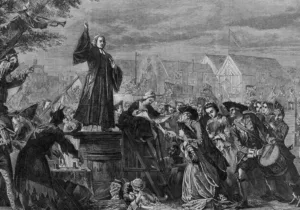At 40 years of age, Joshua David Hawley (R-MO) is the youngest United States senator. By training a lawyer active in numerous conservative causes, he is also one of very few elected officials to have previously established himself as an author in his own right. During his years at Yale Law School, he brought forth Theodore Roosevelt: Preacher of Righteousness (2008), a fresh exploration of the intellectual evolution of an American president of notoriously elusive ideology. The book also provides potential insight into the political ideals of an American senator who is by definition central to the future of the Republican Party and the conservative movement. The result is an interesting, though not altogether convincing portrayal of the twenty-sixth president as a lifelong crusader for moral action.
Hawley’s authorial intent is to demonstrate that throughout the eventful life of Theodore Roosevelt, “the dominant motif was righteousness” (xvii). “Roosevelt never came to rest in life because he never fully reconciled himself to the world as he found it or as he found himself within it,” Hawley writes. Instead, “he was forever trying to understand better and experience more, to improve himself and his circumstances” (xv).
In essentially a narrative history of Roosevelt’s inner life, the reader encounters the sickly child who nevertheless blossomed as an amateur naturalist and explorer, the inquisitive adolescent who devoured by turns Charles Darwin, Herbert Spencer, and the harrowing accounts of British explorers, and the Harvard undergraduate who majored in botany but minored in German language, history, and culture. The tragedies of his early manhood are treated sympathetically, including the political humiliation of his father that spurred him to a career in public service, and the simultaneous deaths of his wife and mother that temporarily turned his restless spirit toward the American West. Subsequent confrontations with by turns William Jennings Bryan, Robert La Follette, and Woodrow Wilson, among others, demonstrate adjustments in Roosevelt’s political thinking according to changing circumstances, with the latter in particular engaging in a spirited public debate in 1912 between “New Nationalism” (Roosevelt) versus “New Freedom” (Wilson). Hawley furthermore emphasizes the centrality of Roosevelt to the subsequent emergence of social welfare legislation and functionalist management more generally: the driving force behind the creation of the American Civil Service, Roosevelt during the final years (1907–09) of his presidency also proposed worker’s compensation, the prohibition of child labor, the eight-hour workday, rights for female workers, further agricultural support, and an inheritance tax.
Although Hawley’s exposition of various historical contexts is sometimes overly detailed, and although the famous Cuban expedition, the governorship of New York, and the vice-presidential period are for some reason completely passed over, a central narrative emerges of Roosevelt rejecting the British neoliberal economic doctrine in favor of vigorous though not meddlesome state supervision of a nationalized political economy. “He sought to use the national state as a moral agent, to bring moral order to a chaotic, profit-obsessed economy,” Hawley concludes. “He wanted to replace class consciousness with national feeling, local loyalties with devotion to the collective” (185).
The primary difficulty is that righteousness (dikaiosýnē) would not seem the appropriate word by which to characterize the evolving political theology of a pompous egotist who seldom spoke of any transcendent moral law. Hawley reveals Roosevelt, in the first instance, to have been a theoretical wanderer who by turns appropriated—despite their mutual contradictions—the social gospel of Washington Gladden, the organic conservatism of Edmund Burke, and the illiberal social contract of Jean-Jacques Rousseau, but always uncritically and instrumentally, without personal modification or enrichment. Roosevelt is also seen in a sustained way to pass off the ideas of others—such as Hamiltonian mercantile-capitalism or contemporary Admiral Mahan’s emphasis on sea power—as if they were his own.
The most profound obstruction to Hawley’s righteous interpretation of Roosevelt, however, was the latter’s assertive, enduring, and uncompromising Anglo-Saxon racialism, derivative of a transformative encounter with social Darwinist thought in childhood and adolescence that was sustained throughout his entire adult life. It dominates his entire oeuvre, with the foreword to his multi-volume Winning of the West (1889–98) extolling the white pioneers for “doing as countless other strong young races had done in the long contest carried on for so many thousands of years between the fit and the unfit.” To a degree more European and imperialist than American and republican, Roosevelt regarded human history as consisting primarily of a struggle between distinct races, of which the Teutonic or Anglo-Saxon race was uniquely destined to surmount historical chaos and inherit an exalted future. Hawley does his utmost to rescue his chosen subject from contemporary condemnation on this account, but is nevertheless forced to concede, “Roosevelt’s moral system was saved from complete depravity only by importing the Christian ethics of his childhood” (73).
To Hawley as United States senator, meanwhile, may on the basis of his book be ascribed much greater knowledge than usual of dueling philosophical tendencies within the history of Republicanism, and therefore a greater capacity to assist in the overdue revitalization of its ideology. His character study of President Roosevelt, in particular, provides much useful insight into the ideological origins of the renewed struggle between nationalist and neoliberal Republicans, which had post-Reagan appeared a settled issue. The titanic head of state himself, however, fails to improve upon further acquaintance.





